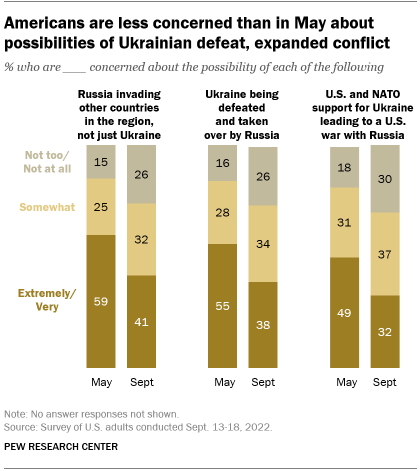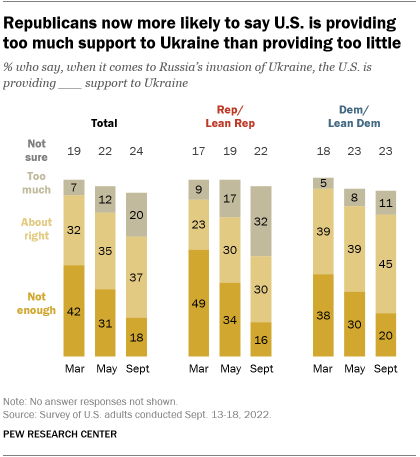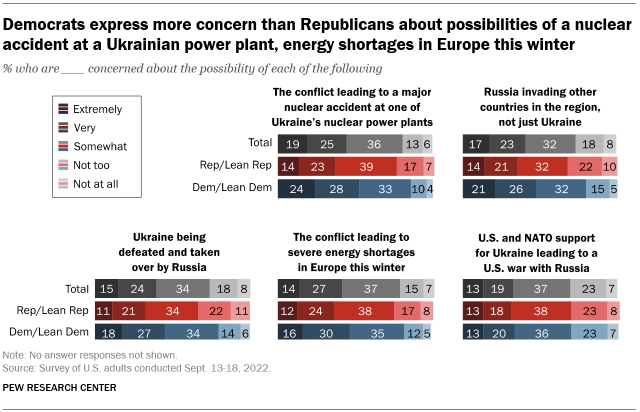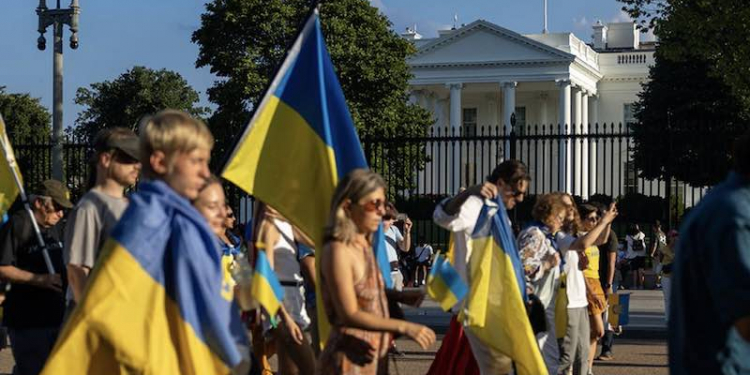Seven months into Russia’s invasion of Ukraine – and following Ukraine’s recent retaking of substantial ground from Russian forces – Americans express less concern than they did in the spring about Ukraine being defeated by Russia and about the war expanding into other countries.

The share of U.S. adults who are extremely or very concerned about a Ukrainian defeat is down 17 percentage points since May, falling from 55% then to 38% today. Roughly a quarter (26%) say they are not too concerned or not at all concerned about Russia defeating Ukraine, up from 16% earlier this year. An additional 34% are somewhat concerned about this, compared with 28% who said so in May, according to a Pew Research Center survey among 10,588 U.S. adults, conducted Sept. 13-18 – in the days prior to Russian President Vladimir Putin’s September 21 announced mobilization of several hundred thousand additional Russian reservists to fight in Ukraine.
With the conflict front and center at the UN General Assembly meetings this week, concern about the possibility of U.S. and NATO support for Ukraine leading to a broader war with Russia has also declined. Around a third of adults (32%) say they are extremely or very concerned about this, down from 49% in May. Concern about Russia invading other countries in the region – not just Ukraine – has also decreased: 41% of adults are currently extremely or very concerned about this, down from 59% in the spring.
With shelling from the war reaching the vicinity of Ukrainian nuclear power plantsin recent months, more than four-in-ten Americans (44%) say they are extremely or very concerned about the possibility of a major nuclear accident at one of Ukraine’s power plants. A somewhat similar share (40%) express concern about the conflict leading to severe energy shortages in Europe this winter.
A quarter of adults currently say they are following news about the war extremely or very closely, down from 36% in May.
Attitudes about U.S. support for Ukraine
Only about two-in-ten Americans (18%) now say the United States is not providing enough support to Ukraine in the conflict. This represents a stark shift from earlier in the war: In March, just after the conflict began, 42% said the U.S. was not providing enough support.

Nearly four-in-ten (37%) now say the U.S. is providing about the right amount of support to Ukraine in the conflict, while 20% say it is providing too much support – up from just 7% who said this in March. About a quarter (24%) say they are not sure.
Three-in-ten Republicans and Republican-leaning independents currently say the U.S. is providing about the right among of support for Ukraine, while a similar share (32%) say the U.S. is providing too much support. Just 16% now say it is not providing enough support. By contrast, in March, about half of Republicans (49%) said the U.S. was not providing enough support, and just 9% said it was providing too much.
The share of Democrats and Democratic-leaning independents who say the U.S. is not providing enough support to Ukraine has also declined, falling to 20% from 38% in March. But only about one-in-ten Democrats (11%) now say the U.S. is providing too much support. More than four-in-ten Democrats (45%) say the U.S. is providing about the right amount of support to Ukraine, up modestly from the share who said this in both March and May.
Partisan differences in concerns about the conflict
Democrats are more likely than Republicans to express a high level of concern about several possibilities that might arise from the conflict between Russia and Ukraine.

About half of Democrats (52%) are extremely or very concerned about the conflict leading to a major nuclear accident at one of Ukraine’s power plants, compared with 37% of Republicans.
Democrats are also more likely than Republicans to be extremely or very concerned about Russia invading other countries in the region (47% vs. 35%), severe energy shortages in Europe this winter (46% vs. 36%) and Ukraine being defeated and taken over by Russia (45% vs. 32%).
Democrats and Republicans express similar levels of concern about U.S. and NATO support for Ukraine leading to a U.S. war with Russia. A third of Democrats and roughly the same share of Republicans (31%) are either extremely or very concerned about this.































Discussion about this post